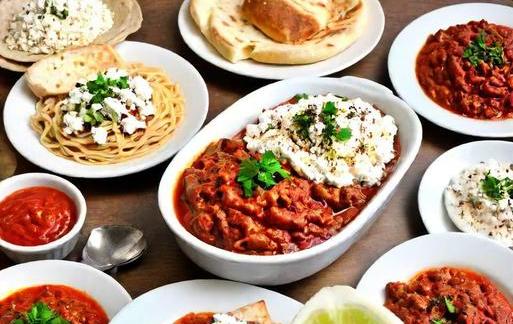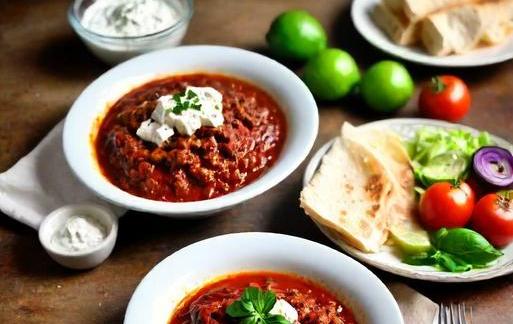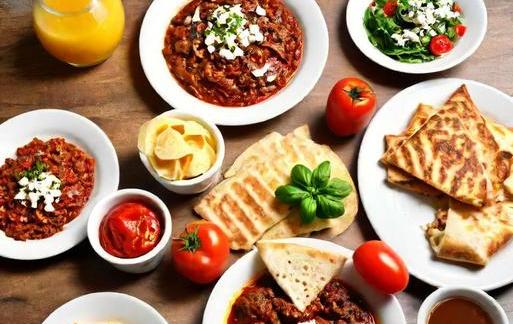- You are here:
- Home »
- Food
- » [REVEALED] Greek Foods That Start With F
[REVEALED] Greek Foods That Start With F
Note: This page contains affiliate links.
As an Amazon Associate, I earn from qualifying purchases when you click on the link, but you are not charged extra.
Greek cuisine is renowned for its rich history, diverse flavors, and emphasis on fresh, high-quality ingredients. From the iconic moussaka to the delectable souvlaki, Greek culinary traditions have left an indelible mark on the global gastronomic landscape. In this exploration of Greek foods, we delve into a specific realm – those delectable dishes that start with the letter “F”. Join us on a culinary journey as we uncover the tantalizing flavors and cultural significance of Greek foods beginning with the letter F.
Contents
List Of Greek Foods That Start With F

1. Fasolada (Φασολάδα)
Description: Fasolada, often hailed as the national dish of Greece, is a hearty bean soup. Made with white beans, tomatoes, olive oil, and a medley of vegetables such as onions, carrots, and celery, it exemplifies the Mediterranean emphasis on simplicity and freshness. This nutritious and flavorful dish is often enjoyed during the cold winter months and is a staple in Greek households.
Ingredients:
- White beans
- Tomatoes
- Olive oil
- Onions
- Carrots
- Celery
Preparation: The beans are soaked overnight and then cooked with the vegetables in a tomato-based broth. Olive oil is added generously to enhance the richness of the soup.
2. Fava (Φάβα)
Description: Fava, not to be confused with the familiar broad bean, is a creamy yellow split pea puree. Often served as a dip, it is seasoned with olive oil, lemon juice, and herbs. This appetizer is a delightful blend of smooth texture and vibrant flavors, making it a popular choice in both casual and upscale Greek dining.
Ingredients:
- Yellow split peas
- Olive oil
- Lemon juice
- Herbs (such as parsley or mint)
Preparation: The split peas are cooked until tender, then blended into a smooth puree. Olive oil, lemon juice, and herbs are added to create a harmonious balance of flavors.
3. Fasolia Gigantes (Φασόλια Γίγαντες)
Description: Fasolia Gigantes, translating to "giant beans," are large white beans that are a key ingredient in various Greek dishes. One popular preparation involves baking them in a rich tomato sauce, creating a dish known as "Gigantes Plaki." The beans absorb the flavors of the tomato sauce, creating a comforting and satisfying meal.
Ingredients:
- Giant white beans
- Tomatoes
- Olive oil
- Garlic
- Onion
Preparation: The giant beans are cooked until tender, then baked in a tomato sauce infused with olive oil, garlic, and onions. This results in a hearty and flavorful dish.
4. Fakes Soupa (Φακές Σούπα)
Description: Fakes Soupa is a traditional Greek lentil soup that epitomizes the simplicity and nutritional value of Greek cuisine. Lentils, often considered a superfood, are simmered with tomatoes, olive oil, and various aromatic herbs. This nutritious soup is both filling and delicious, making it a popular choice for a wholesome meal.
Ingredients:
- Lentils
- Tomatoes
- Olive oil
- Garlic
- Bay leaves
Preparation: Lentils are cooked in a flavorful broth made with tomatoes, olive oil, garlic, and bay leaves. The result is a hearty soup that showcases the earthy goodness of lentils.
5. Fyllo (Φύλλο)
Description: Fyllo, also known as phyllo or filo, is a thin unleavened dough that plays a crucial role in Greek pastry-making. This paper-thin dough is layered to create a flaky texture in various sweet and savory dishes. Spanakopita, a popular Greek spinach pie, and baklava, a sweet pastry filled with nuts and honey, are classic examples of the versatile applications of fyllo.
Ingredients:
- Flour
- Water
- Olive oil
- Salt
Preparation: Fyllo dough is made by rolling out thin layers of dough, brushing each layer with olive oil, and stacking them to create a flaky texture. It is widely used in both sweet and savory Greek dishes.
6. Fakes Moutzentra (Φακές Μουτζέντρα)
Description: Fakes Moutzentra is a Cypriot dish that features lentils cooked with bulgur wheat. This wholesome and nutritious dish is flavored with cumin and coriander, adding a distinctive taste to the lentils. Often served with a drizzle of olive oil, Fakes Moutzentra is a comforting dish that showcases the culinary influences of the region.
Ingredients:
- Lentils
- Bulgur wheat
- Cumin
- Coriander
- Olive oil
Preparation: Lentils and bulgur wheat are cooked together with cumin and coriander, creating a flavorful and hearty dish. Olive oil is added for a finishing touch.
7. Feta (Φέτα)
Description: Feta, a cheese synonymous with Greek cuisine, is a brined curd cheese made from sheep’s milk. Known for its crumbly texture and tangy flavor, feta is used in a myriad of Greek dishes, from salads to pastries. It is often served with olives and drizzled with olive oil, creating a simple yet iconic appetizer.
Ingredients:
- Sheep’s milk
- Rennet
- Salt
Preparation: Feta is made by curdling sheep’s milk with rennet, then allowing the curds to set before cutting them into small pieces. The curds are drained, salted, and aged in a brine solution, resulting in the characteristic flavor and texture of feta.
8. Fasolakia (Φασολάκια)
Description: Fasolakia, meaning green beans in Greek, is a dish that highlights the freshness of vegetables. Green beans are simmered in a tomato-based sauce with olive oil, onions, and tomatoes, creating a vibrant and flavorful side dish. Often paired with meat or enjoyed on its own, fasolakia is a staple in Greek households.
Ingredients:
- Green beans
- Tomatoes
- Olive oil
- Onions
- Garlic
Preparation: Green beans are cooked with tomatoes, olive oil, onions, and garlic until tender. The result is a colorful and nutritious side dish that complements various main courses.
9. Filo Me Kima (Φύλλο Με Κιμά)
Description: Filo Me Kima is a classic Greek dish featuring minced meat, often lamb or beef, encased in layers of fyllo dough. This savory pie, also known as "Kreatopita," is seasoned with herbs and spices, creating a flavorful and satisfying meal. Filo Me Kima showcases the Greek love for combining simple ingredients to create dishes that are both delicious and comforting.
Ingredients:
- Minced meat (lamb or beef)
- Fyllo dough
- Olive oil
- Onions
- Herbs and spices
Preparation: Minced meat is sautéed with onions, herbs, and spices, then layered between sheets of fyllo dough. The pie is baked until golden brown, creating a delicious and hearty dish.
10. Frigania (Φρυγανιά)
Description: Frigania is a traditional Greek sweet bread that is often enjoyed during religious celebrations and festive occasions. This rich and flavorful bread is made with a combination of ingredients such as orange zest, walnuts, and cinnamon. Served in slices, Frigania is a delightful treat that embodies the warmth and hospitality of Greek culture.
Ingredients:
- Flour
- Sugar
- Orange zest
- Walnuts
- Cinnamon
Preparation: The dough is prepared with flour, sugar, orange zest, walnuts, and cinnamon. After rising, it is baked until golden brown, resulting in a sweet and aromatic bread that is often enjoyed with coffee or tea.
Greek cuisine, with its emphasis on fresh ingredients and simple yet flavorful combinations, offers a diverse array of dishes that start with the letter “F”. From the hearty Fasolada to the delicate layers of Fyllo in pastries, each dish reflects the cultural richness and culinary expertise of Greece. Whether you’re savoring the tangy goodness of Feta or indulging in the sweetness of Frigania, Greek foods that start with ‘F’ invite you to experience the depth and variety of Hellenic gastronomy. As you embark on your culinary journey, remember that each dish is not just a meal but a celebration of tradition, history, and the joy of sharing good food with loved ones.
Significance

Greek cuisine is a rich tapestry of flavors, aromas, and traditions that have stood the test of time. From the iconic moussaka to the irresistible baklava, Greek foods have captivated taste buds worldwide. In this culinary journey, we will delve into the delectable realm of Greek foods that start with the letter ‘F’. Each dish encapsulates the essence of Greek gastronomy, reflecting a history deeply intertwined with culture, geography, and a love for wholesome ingredients.
The significance of Greek foods that start with ‘F’ lies not just in the culinary delight they offer but also in the cultural and historical context they bring to the table. Greece’s geographical diversity, with its coastline, islands, and mountainous terrain, has played a pivotal role in shaping its cuisine. The utilization of fresh, local ingredients and traditional cooking methods has been a constant throughout Greek history, providing a unique identity to their culinary heritage.
Category-Related

1. Fasolada (Φασολάδα): The Bean Soup Marvel
Fasolada, often hailed as the national dish of Greece, is a hearty bean soup that embodies the simplicity and nutritional richness of Greek cuisine. Made with white beans, tomatoes, olive oil, and an assortment of vegetables such as onions, carrots, and celery, Fasolada is a comfort food staple. Seasoned with aromatic herbs like oregano and bay leaves, this dish is a celebration of earthy flavors that resonate with Greek home cooking.
2. Fava (Φάβα): The Yellow Split Pea Puree
Fava, a classic Greek appetizer, is a velvety puree made from yellow split peas. Boasting a creamy texture and a vibrant yellow hue, Fava is seasoned with olive oil, lemon juice, and occasionally topped with capers or onions. Often served as a meze (appetizer) or a side dish, Fava showcases the Greek penchant for transforming humble ingredients into culinary delights.
3. Fasolia Gigantes (Φασόλια Γίγαντες): Giant Beans In Tomato Sauce
Fasolia Gigantes, or giant beans, are a beloved Greek dish that features oversized lima beans cooked in a rich tomato sauce. This hearty and flavorful dish is often baked to perfection, allowing the beans to absorb the savory essence of tomatoes, olive oil, and various herbs. Fasolia Gigantes exemplifies the Greek talent for crafting comforting and satisfying meals with simple yet high-quality ingredients.
4. Feta Cheese (Φέτα): The Quintessential Greek Cheese
While not a dish in itself, Feta cheese is an indispensable component of Greek cuisine. Made from sheep or goat milk, Feta is a crumbly and tangy cheese that finds its way into numerous Greek dishes. Whether crumbled over salads, stuffed into pastries, or served as a standalone appetizer, Feta is a versatile ingredient that enhances the authenticity of Greek flavors.
Common Themes
Mediterranean Diet: A Culinary Heritage
Greek foods that start with ‘F’ are often a testament to the Mediterranean diet, celebrated for its health benefits and delectable flavors. Olive oil, a staple in Greek cooking, is a common thread connecting these dishes. Its use not only adds a distinctive taste but also contributes to the renowned health benefits associated with the Mediterranean diet.
Vegetarian Delights
Many Greek dishes that start with ‘F’ showcase the country’s proficiency in creating flavorful and satisfying vegetarian options. Fasolada, Fava, and Fasolia Gigantes are exemplary dishes that highlight the Greek mastery of transforming plant-based ingredients into culinary masterpieces.
Culinary Traditions Passed Down Through Generations
Greek cuisine is steeped in tradition, with recipes often passed down from one generation to the next. The preparation of dishes like Fasolada and Fasolia Gigantes is a communal affair, fostering a sense of connection and continuity. This tradition is not just about the food itself but the shared experience of preparing and enjoying it together.
Interesting Facts
Olives: A Time-Honored Greek Staple
While not directly related to the letter “F”, olives deserve a mention due to their integral role in Greek cuisine. Greece is one of the largest producers of olives in the world, and these small, flavorful fruits find their way into various Greek dishes. Whether served as a snack, added to salads, or pressed into olive oil, olives are a symbol of Greek abundance and a testament to the country’s olive-growing heritage.
Phyllo Dough Mastery
The extensive use of phyllo dough in Greek cuisine is worth noting. While not exclusive to dishes that start with “F”, the mastery of creating delicate, paper-thin layers of dough is a culinary art form in Greece. Whether it’s the crispy layers of a spanakopita or the sweet embrace of baklava, the use of phyllo dough is a testament to Greek pastry craftsmanship.
Regional Variations In Fava Preparation
Fava, despite being a seemingly simple dish, exhibits regional variations across Greece. The island of Santorini, for example, is renowned for its unique version of Fava, made from the local yellow split peas grown in the island’s volcanic soil. Exploring these regional nuances adds depth to the understanding of Greek culinary diversity.
Conclusion
In the realm of Greek foods that start with “F”, each dish is a chapter in the culinary narrative of a nation with a rich history and an enduring love for good food. From the wholesome goodness of Fasolada to the creamy elegance of Fava, and the heartiness of Fasolia Gigantes, these dishes exemplify the artistry of Greek cooking. The common themes of the Mediterranean diet, vegetarian delights, and the passing down of culinary traditions add layers of significance to these gastronomic creations.
As we explore the world of Greek foods, it becomes evident that the letter ‘F’ is not just a linguistic construct but a doorway into a world of flavors, textures, and cultural stories. The dishes discussed here are not mere recipes; they are embodiments of a cultural legacy that continues to thrive on dinner tables, both in Greece and around the globe. So, the next time you savor a spoonful of Fasolada or indulge in the creamy goodness of Fava, remember that you are not just enjoying a meal; you are partaking in a centuries-old culinary journey through the heart of Greece.


